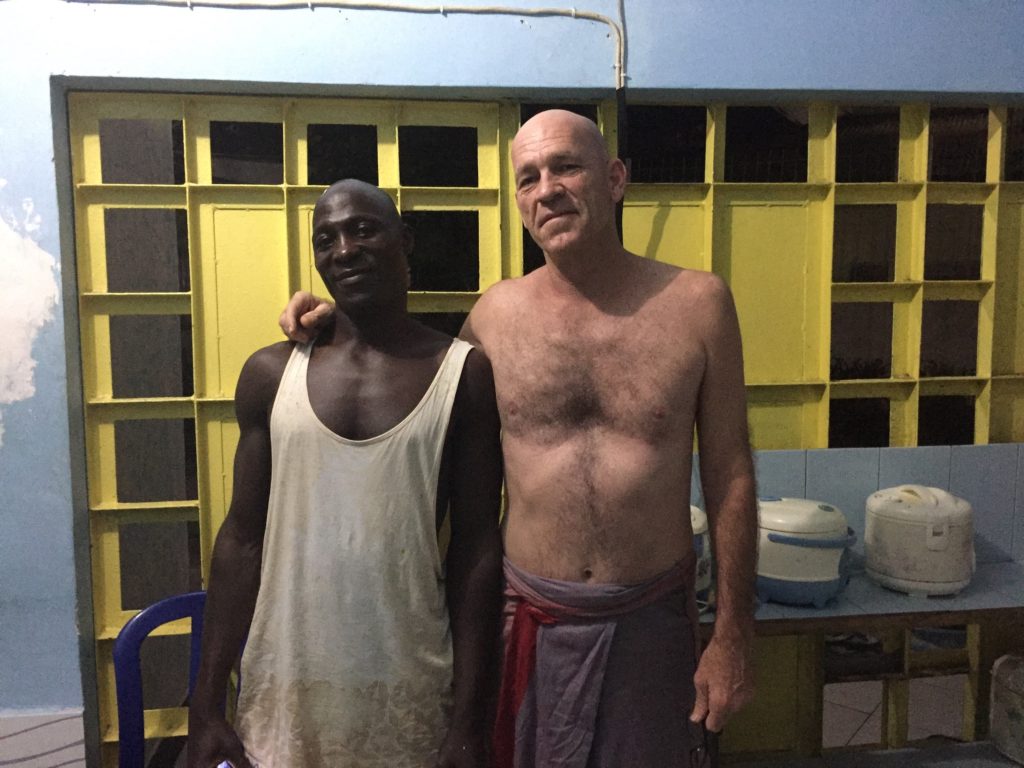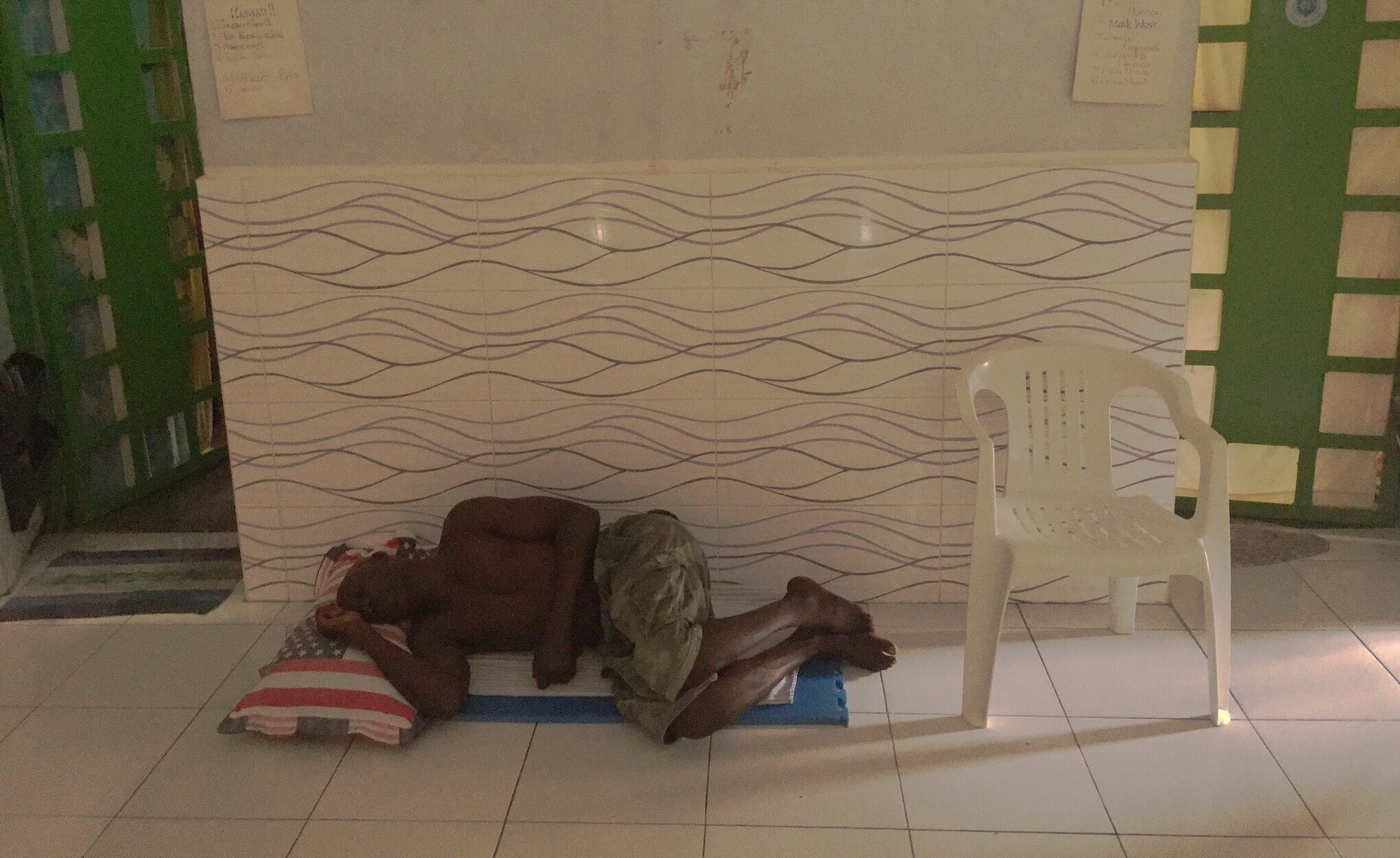Ronald Semanda was known in the trade as a good swallower, easily capable of consuming a kilo of crystal meth wrapped in dozens of small pellets and retaining the package in his stomach for up to 60 hours.
The Ugandan, who hails from a small village outside Entebbe, got into trafficking in early 2010 through a friend after losing his job as a clerk in a small Kampala coffee trading company.
“I had four children and was also supporting my mother and my brother’s family,” the now 42-year-old said. “I needed money and my friend suggested I come with him to learn about a good way to make cash.”
Nigerian and South African drug barons have exploited Uganda’s lack of crystal meth legislation by opening small laboratories in Kampala and using jobless locals to courier their product to Asia via the Middle East.
Ronald’s task was recruit couriers from the ranks of Uganda’s unemployed. Years of relative stability meant Uganda was churning out high school and university graduates, but there were no jobs being created. This meant there was no shortage of recruits.
“We would organize a passport for them, buy them a ticket and book their hotel,” he said. “We would give them new clothes and also $50 a day for expenses while they were traveling.
“We would always send them through Dubai or Qatar to Malaysia, Indonesia or Hong Kong. On the way back we promise them they will be connected with a recruitment agency so there is a chance they can get a job in the Middle East.”
Those jobs never materialized, but the $1,500 earned for a successful week-long run had many couriers coming back for more.
The couriers had the choice of either carrying the drugs hidden in a suitcase, or swallowing them.
“The risk of a suitcase is always higher because if they are not packed properly, they will be seen by the x-ray machines,” says Ronald.
“Swallowing is much safer, but not everyone can swallow much drugs. Many people get sick and vomit straight away.”
Ronald was promoted from recruiting to training swallowers. A new recruit would have two practice attempts — swallowing the drugs to see how long they could retain them — before being sent on their mission.
A kilo of crystal meth would be made up of around 50-60 thumb sized condom-wrapped pellets. It would take up to four hours for a courier to consume his cargo, coating the pellets in condensed milk and chasing each one with a gulp of banana smoothie.
At the other end, so to speak, the courier would take a laxative and let nature take its course. It would usually take several hours to expel all the pellets.
Ronald was only earning around $100 a week for his efforts, so he decided to try being a courier himself.
“In the six months I was training, only one person was caught so I thought it was quite safe,” he said. “I had practiced swallowing and found it quite easy. In fact, I could do more than a kilo.”
His first run was to Tehran via Qatar and although he was nervous, it went off without a hitch.
“I held my bible in my hand for the whole journey and prayed to God to help me,” he said.
Many more trips followed — to Hong Kong, China and Malaysia — and each one went smoothly. He was rarely stopped or questioned, and his cover as a coffee dealer passed muster the few times he was.
 “Actually the more you do it, the safer it becomes,” he said. “If you have a new passport and you are on your first trip, you will be nervous and they will be suspicious. If you have an old passport with many stamps, you can talk about all the places you have been. They believe you.”
“Actually the more you do it, the safer it becomes,” he said. “If you have a new passport and you are on your first trip, you will be nervous and they will be suspicious. If you have an old passport with many stamps, you can talk about all the places you have been. They believe you.”
Ronald’s downfall came when he decided to do a run for a new rival syndicate for twice what he had been earning.
“I got greedy,” he said, “but I was also betrayed.”
In July 2011 he swallowed a whopping 1.4 kgs of crystal meth and headed for Jakarta via Qatar and Singapore. The haul had a street value of $250,000; Ronald’s take just $3,000.
Waiting in transit in Doha, he became suspicious when approached by officials who checked his passport before taking his picture with a cellphone.
“I wanted to abort the mission,” he said, “but it would be very difficult. I called the boss and he assured me everything was ok.”
His concerns largely evaporated after successfully transiting through Singapore, but on arrival in Jakarta he was immediately pulled up and taken aside.
“They checked my bags so thoroughly but found nothing. They questioned me for more than 12 hours, but got nothing.”
But Ronald, literally, couldn’t hold out forever.
“I had swallowed too much. Usually I can keep it for at least another 24 hours, but I had to go to the toilet. When I asked they said no problem, go ahead, but when I got in the room there was only a bowl. I was finished.”
Ronald excreted 82 pellets of crystal meth weighing 1.4 kgs — an Indonesian record he wryly acknowledges — and was arrested and charged with trafficking.
Authorities tried everything they could to get him to complete the drop so they could catch those on the receiving end. They promised to go lightly on him, warned he’d get the death sentence if he didn’t cooperate, and even resorted to violence.
He refused, and that probably saved his life. The laws in Indonesia are such that if you claim you acted alone, you are only charged with trafficking. If you give up others, it becomes a conspiracy and carries a far heavier sentence for all involved — usually the death penalty.
Ronald’s original boss, while furious at his betrayal, helped with his legal fees and he was eventually handed a 15-year-sentence. He learnt later that the new boss he’d done the run for had offered him up as a sacrificial lamb in order to get a foothold in the Indonesian market.
Ronald has had a roller-coaster of a ride in Kerobokan. His boss sent him $100 a month for the first year, but the gang’s management, as often happens in the underworld, changed and eventually he was forgotten.
He started a business behind bars, buying snacks from one of the guard’s wives, and reselling to prisoners. He’d focus on the druggie blocks, where inmates were generally too wasted to have the gumption to do it for themselves, but his customers were always demanding credit and he struggled to keep a cash float.
When I arrived, he’d hit the bottom. Some of his customers had taken to paying him in crystal meth, and Ronald was using instead of selling it on.
He fell behind on his room payments and his block rent, he didn’t have the cash to buy the snacks he was reselling, and he owed money.
After appel one night, the three Nigerians and a Ugandan countryman in the block gave him a few meaty slaps before kicking him out of his cell and warning he would be severely beaten if he continued using crystal meth.
“There is nothing wrong with smoking dope, but we Africans don’t do shabu,” said Austin, the block’s de facto leader.
“He became an embarrassment. Selling is ok, but he can’t use. Black men can’t do shabu. They become useless.”
Ronald owed around $1,500 to various heavies around the jail, but the Nigerians bought his debt and have put him to work in the block as a part-time cleaner. They also gave him enough of a float to restart his snack business, so if he keeps clean he should be in the clear in a year or so.
“I was very depressed and lost my way,” he said. “But I am reading my bible again and I hope the lord will help me.”
As a long termer, being forced to sleep in the aula (hall) is a big loss of face and status, but he won’t get a room again until he can raise the $300 entry fee.
Communicating with home is also a problem after his phone was stolen by a fellow inmate as he slept. The culprit, the South African “Oom Schalk Laurens”, was swiftly caught, but had already sold it and used the money to pay a drug debt.
Ronald was given carte blanche to take what he wanted from the thief, but Oom Schalk possessed nothing of value. He also declined to give his robber a good thrashing, as is prison custom, saying the Bible taught him to turn the other cheek.
“I think the lord is punishing me for dealing in drugs,” Ronald says.
With mandatory remissions and time off for good behavior, Ronald should be free around 2022, long after his children have grown up.
“I made a big mistake but my family know I did it for them,” he said. “There will be no shame when I get home, but I will not do it again. I just want a quiet life now.”

Thank you for sharing. A really sad story. Especially because he is alone and won’t have friends or family visiting him. I really hope the drug laws will change in the near future and people like him will be released much sooner.
I hope to do profiles on all the inmates who will let me, if people are interested in reading.
I am interested:)
great read David, there must interesting scope available in Hotel K.Glad i finally got in.
I’d like to read more – tough though. 🙁
You can take the boy out of Reuters but you can’t take the Reuters out of David Fox! Classic reporting Coot. Please do write more of them x
“At the other end, so to speak …” — a great read, David!
Powerful story. My uncle, god rest his soul, was chaplain at Brixton prison for several years. He was convinced that drug legislation was discrimination against poor people. It seems that applies everywhere in the world
Enjoyed the read David. Keep at it mate!
This is a truly top notch piece of journalism.
That is a melancholy tale. Thanks for sharing David. It is interesting what an eclectic mix there are in there.
Great profile, David. This blog is my favourite read of the year.
Definitely interested in reading more. Aside from the obvious quality of your ‘ritin skillz’ the subject matter is such that the stories are compelling for their humanity.
Fantastic news on your sentencing btw Pisser, sometimes the justice system does get it something approaching right.
All the best for the next couple of months and beyond.
bbb
Your stories always show the humanity of even the unlikeliest characters Foxy.
Outstanding
A great yarn.
They can’t lock away your talent! The book is all but written; you went through all of this for very good reasons, David.